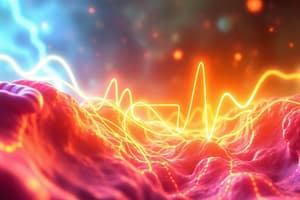Podcast
Questions and Answers
What is membrane potential?
What is membrane potential?
- The flow of ions within the cell
- The production of ATP within the cell
- The difference in electrical potential between the intracellular fluid and the extracellular fluid (correct)
- The synthesis of proteins within the cell
Why is there a membrane potential in biological cells?
Why is there a membrane potential in biological cells?
- To maintain a balance between intracellular and extracellular fluid (correct)
- To synthesize neurotransmitters for cell communication
- To produce energy for cellular activities
- To allow the flow of ions freely across the cell membrane
What contributes to the unequal distribution of charges across the cell membrane?
What contributes to the unequal distribution of charges across the cell membrane?
- Easy diffusion of sodium ions out of the cell
- High concentration of chloride ions in the cytosol
- Presence of positively charged proteins inside the cell (correct)
- Equal permeability of all ions through the cell membrane
Which ion has higher permeability through the cell membrane?
Which ion has higher permeability through the cell membrane?
What is the typical range of membrane potential in biological cells?
What is the typical range of membrane potential in biological cells?
In which fluid do potassium ions (K+) have high concentrations?
In which fluid do potassium ions (K+) have high concentrations?
What is the typical resting membrane potential of large nerve fibers?
What is the typical resting membrane potential of large nerve fibers?
What is the primary mechanism for preventing the influx of ions and cell swelling in nerve cells?
What is the primary mechanism for preventing the influx of ions and cell swelling in nerve cells?
What type of channel is normally closed at the physiologic or resting membrane potential?
What type of channel is normally closed at the physiologic or resting membrane potential?
Which ion is about 1000-fold more permeable than sodium ions through voltage-dependent calcium channels under normal physiological conditions?
Which ion is about 1000-fold more permeable than sodium ions through voltage-dependent calcium channels under normal physiological conditions?
What is the necessary actor in causing both depolarization and repolarization of the nerve membrane during the action potential?
What is the necessary actor in causing both depolarization and repolarization of the nerve membrane during the action potential?
During the action potential, what happens to the sodium permeability of the nerve membrane?
During the action potential, what happens to the sodium permeability of the nerve membrane?
What type of channels are found in excitable cells like muscle and neurons with a permeability to calcium ions?
What type of channels are found in excitable cells like muscle and neurons with a permeability to calcium ions?
What is the primary mechanism for preventing cell swelling due to large numbers of negatively charged proteins inside the cell?
What is the primary mechanism for preventing cell swelling due to large numbers of negatively charged proteins inside the cell?
Which ion has high cell permeability due to leakage through the nerve cell membrane, contributing to the resting membrane potential?
Which ion has high cell permeability due to leakage through the nerve cell membrane, contributing to the resting membrane potential?
Which type of stimulus channels are named according to the ligand to which they respond?
Which type of stimulus channels are named according to the ligand to which they respond?
What does the abbreviation 'VDCC' stand for in the context of nerve cells?
What does the abbreviation 'VDCC' stand for in the context of nerve cells?
Which type of ion channel responds based on the stimulus to which they are exposed?
Which type of ion channel responds based on the stimulus to which they are exposed?
What contributes to the unequal distribution of charges across the cell membrane?
What contributes to the unequal distribution of charges across the cell membrane?
What is the typical range of membrane potential in biological cells?
What is the typical range of membrane potential in biological cells?
What is the primary mechanism for preventing the influx of ions and cell swelling in nerve cells?
What is the primary mechanism for preventing the influx of ions and cell swelling in nerve cells?
What type of channels are found in excitable cells like muscle and neurons with a permeability to calcium ions?
What type of channels are found in excitable cells like muscle and neurons with a permeability to calcium ions?
During the action potential, what happens to the sodium permeability of the nerve membrane?
During the action potential, what happens to the sodium permeability of the nerve membrane?
What is the typical range of membrane potential in biological cells?
What is the typical range of membrane potential in biological cells?
What contributes to the unequal distribution of charges across the cell membrane?
What contributes to the unequal distribution of charges across the cell membrane?
Why is there a membrane potential in biological cells?
Why is there a membrane potential in biological cells?
What does the abbreviation 'VDCC' stand for in the context of nerve cells?
What does the abbreviation 'VDCC' stand for in the context of nerve cells?
What is membrane potential?
What is membrane potential?
Study Notes
Membrane Potential
- Membrane potential is the separation of electric charge across the cell membrane.
- There is a membrane potential in biological cells because of the unequal distribution of charges across the cell membrane.
Unequal Distribution of Charges
- The unequal distribution of charges is contributed by the concentration of potassium ions (K+) being higher inside the cell and sodium ions (Na+) being higher outside the cell.
- The permeability of the cell membrane to potassium ions is higher than to sodium ions.
Resting Membrane Potential
- The typical range of membrane potential in biological cells is -60 to -80 millivolts (mV).
- The typical resting membrane potential of large nerve fibers is -70 mV.
Ion Channels
- Voltage-dependent calcium channels are normally closed at the physiologic or resting membrane potential.
- Calcium ions (Ca²⁺) are about 1000-fold more permeable than sodium ions through voltage-dependent calcium channels under normal physiological conditions.
Action Potential
- The necessary actor in causing both depolarization and repolarization of the nerve membrane during the action potential is voltage-gated ion channels.
- During the action potential, the sodium permeability of the nerve membrane increases.
Channel Types
- Ligand-gated channels are named according to the ligand to which they respond.
- Voltage-gated channels respond based on the stimulus to which they are exposed.
- Voltage-dependent calcium channels (VDCC) are found in excitable cells like muscle and neurons with a permeability to calcium ions.
Cell Swelling Prevention
- The primary mechanism for preventing cell swelling due to large numbers of negatively charged proteins inside the cell is the efflux of potassium ions.
- The primary mechanism for preventing the influx of ions and cell swelling in nerve cells is the efflux of potassium ions through leakage channels.
Studying That Suits You
Use AI to generate personalized quizzes and flashcards to suit your learning preferences.
Description
Test your knowledge of membrane potentials and action potentials with this quiz. Learn about the difference in electrical potential between the intracellular fluid and the extracellular fluid of a biological cell, and the reasons behind membrane potential.




